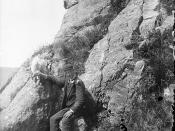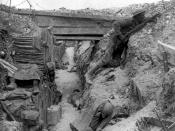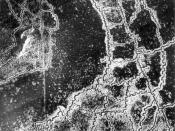When war was declared in 1914, many young British and German men rejoiced. They greeted the news enthusiastically. With the rush to enlist, their patriotic and nationalistic attitudes were clearly on display. At this time, the reality of war was overridden by the romantic notion that this war would simply be a 'good ole biff'. Aroused by the overwhelming sense of mateship and duty, men rushed to enlist in their thousands. Almost everyone expected a brief, spectacular, and triumphant campaign. Everyone wanted to be a part of it; everyone wanted to be in it. Such attitudes reflected the culture of the age. However as the first wave of troops were sent to the front line, and the men came to experience the horrific nature of trench warfare, their romantic notions were quickly dissuaded and the realisation of the reality of war set in. As the war progressed, attitudes changed.
There was a major turnaround in morale and enthusiasm for continuing the war from both the perspective of the soldier on the Western Front and those at home.
For the young men of both Britain and Germany, their enthusiastic attitude towards war reflected their belief that this was an opportunity for adventure, to travel and see the world in a way that most would never have been able to do. Their patriotic attitude and national zeal was a product of the times, institutionalised through their class, education and society's understanding of what it meant 'to be a man'. In the early stages of the war, both countries saw a huge influx of men wishing to enlist; only the fittest and healthiest specimens were selected. Although the legal age for enlistment was 18, many boys, as young as 14 lied about their age and forged birth certificates to ensure they would...


